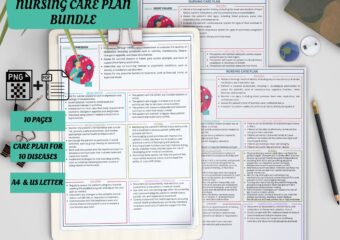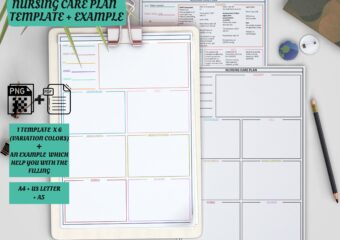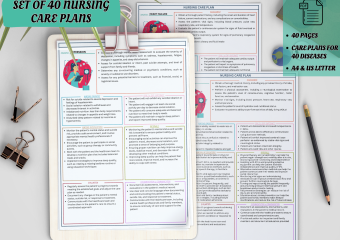Why Are Care Plans Important In Nursing?

- How to Write Effective Therapy Progress Notes - January 7, 2025
- How to create SMART Goals in Therapy - October 8, 2024
- MICU vs SICU: What is the difference? - March 25, 2024
Care plans in nursing are comprehensive, detailed strategies designed to address the unique health needs and goals of individual patients. They serve as a crucial component of patient-centered care and are fundamental in ensuring high-quality healthcare.
At their core, nursing care plans are built around the nursing process, which encompasses assessment, diagnosis, planning, implementation, and evaluation. This structured approach begins with a thorough assessment of the patient’s health status, including their medical history, physical examinations, and considerations of psychological and social factors.
Following the assessment, nurses formulate a nursing diagnosis. This diagnosis is a clinical judgment about the patient’s responses to actual or potential health issues or life processes. It’s a critical step that sets the stage for the planning phase, where realistic and measurable goals are set to improve the patient’s health and wellbeing. These goals help in determining the priorities and sequence of nursing actions.
The implementation phase involves carrying out the planned nursing interventions, which are the actions taken to address the nursing diagnosis. These interventions are based on evidence and best practices, ensuring that the patient receives the most effective care.
Regular evaluation is a key aspect of care plans, allowing nurses to assess the effectiveness of the care and make necessary adjustments. This ensures that the care remains responsive to the patient’s evolving needs.
Care plans serve not only as a guideline for individual patient care but also as a vital communication tool within the healthcare team, ensuring that everyone is informed and coordinated in their efforts. They are dynamic and adaptable documents, regularly reviewed and updated to reflect the patient’s changing condition or circumstances.
The development of a care plan is a collaborative effort, involving input from nurses, patients, and other healthcare professionals. This collaboration ensures that the care plan is holistic, covering all aspects of the patient’s wellbeing—physical, emotional, social, and spiritual.
Nursing care plans are utilized across various healthcare settings, from hospitals to long-term care facilities, and in community health and home care. They can be tailored to meet the needs of patients with specific conditions, such as those with chronic illnesses, those requiring post-operative care, or those in palliative care.

Importance of Nursing Care Plans
Here’s a detailed exploration of why care plans are so important in nursing:
Individualized Patient Care
- Tailored Approach: Care plans are developed based on a thorough assessment of the patient’s individual health needs, preferences, and history. This allows for a tailored approach that addresses specific health conditions and patient concerns.
- Patient Empowerment: By involving patients in their care planning, nurses empower them to take an active role in their health management, increasing patient engagement and compliance.
Enhanced Communication
- Interdisciplinary Collaboration: Care plans facilitate communication among various healthcare team members, ensuring that everyone is aware of the patient’s needs and the planned interventions.
- Continuity of Care: They provide a documented pathway of care that can be easily accessed and understood by different healthcare providers, ensuring continuity of care, especially during handovers or transitions.
Quality and Safety in Care Delivery
- Evidence-Based Interventions: Care plans are often based on evidence-based practices, which means they incorporate the latest research and best practices in healthcare.
- Risk Management: They help in identifying potential risks and implementing preventive measures, thereby enhancing patient safety.
Goal Setting and Evaluation
- Measurable Outcomes: Setting specific, measurable, achievable, relevant, and time-bound (SMART) goals in care plans allows for ongoing evaluation of patient progress.
- Adjustment of Care: Regular review and updating of care plans based on patient progress or changes in condition ensure that the care remains relevant and effective.
Legal and Professional Accountability
- Documentation: Care plans serve as legal documents that record the care provided. They are crucial for legal protection of both the patient and healthcare providers.
- Professional Standards: They reflect adherence to professional standards and guidelines, demonstrating a commitment to quality care.
Educational Tool
- Learning for Healthcare Professionals: For nursing students and new staff, care plans are valuable learning tools, helping them understand the rationale behind various care decisions and interventions.
- Patient and Family Education: They also serve as a basis for educating patients and families about the condition, care process, and self-management strategies.
Holistic Care
- Addressing Multiple Facets: Care plans recognize the multifaceted nature of health, addressing physical, emotional, social, and spiritual aspects of patient care.
- Cultural Sensitivity: They can be tailored to respect cultural beliefs and practices, ensuring culturally competent care.
Resource Management
- Efficient Use of Resources: By outlining specific care needs and interventions, care plans help in the efficient allocation and utilization of healthcare resources.
- Cost-Effectiveness: Effective care planning can lead to more cost-effective care by preventing complications and reducing the need for unnecessary interventions.



